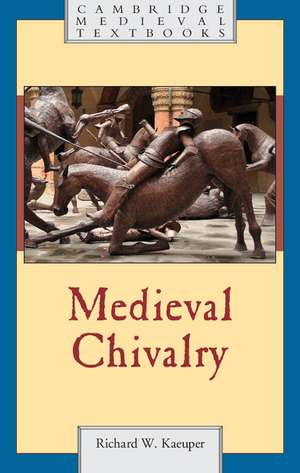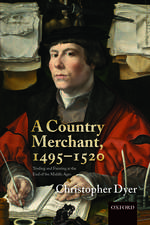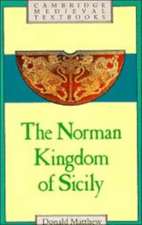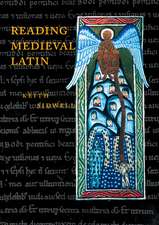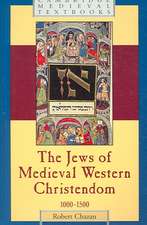Medieval Chivalry: Cambridge Medieval Textbooks
Autor Richard W. Kaeuperen Limba Engleză Paperback – 18 mai 2016
| Toate formatele și edițiile | Preț | Express |
|---|---|---|
| Paperback (1) | 171.24 lei 3-5 săpt. | +20.06 lei 7-13 zile |
| Cambridge University Press – 18 mai 2016 | 171.24 lei 3-5 săpt. | +20.06 lei 7-13 zile |
| Hardback (1) | 645.26 lei 6-8 săpt. | |
| Cambridge University Press – 18 mai 2016 | 645.26 lei 6-8 săpt. |
Din seria Cambridge Medieval Textbooks
-
 Preț: 204.78 lei
Preț: 204.78 lei -
 Preț: 209.74 lei
Preț: 209.74 lei -
 Preț: 238.60 lei
Preț: 238.60 lei -
 Preț: 392.66 lei
Preț: 392.66 lei -
 Preț: 226.53 lei
Preț: 226.53 lei -
 Preț: 281.09 lei
Preț: 281.09 lei -
 Preț: 234.23 lei
Preț: 234.23 lei -
 Preț: 398.83 lei
Preț: 398.83 lei - 11%
 Preț: 554.35 lei
Preț: 554.35 lei -
 Preț: 285.27 lei
Preț: 285.27 lei - 11%
 Preț: 574.33 lei
Preț: 574.33 lei -
 Preț: 327.41 lei
Preț: 327.41 lei -
 Preț: 413.31 lei
Preț: 413.31 lei -
 Preț: 267.18 lei
Preț: 267.18 lei -
 Preț: 292.19 lei
Preț: 292.19 lei -
 Preț: 383.37 lei
Preț: 383.37 lei -
 Preț: 436.45 lei
Preț: 436.45 lei -
 Preț: 319.74 lei
Preț: 319.74 lei -
 Preț: 322.62 lei
Preț: 322.62 lei -
 Preț: 375.21 lei
Preț: 375.21 lei -
 Preț: 365.34 lei
Preț: 365.34 lei -
 Preț: 289.78 lei
Preț: 289.78 lei -
 Preț: 439.33 lei
Preț: 439.33 lei -
 Preț: 290.28 lei
Preț: 290.28 lei -
 Preț: 320.50 lei
Preț: 320.50 lei -
 Preț: 441.67 lei
Preț: 441.67 lei - 11%
 Preț: 457.95 lei
Preț: 457.95 lei -
 Preț: 363.65 lei
Preț: 363.65 lei -
 Preț: 287.39 lei
Preț: 287.39 lei - 14%
 Preț: 756.74 lei
Preț: 756.74 lei - 14%
 Preț: 885.74 lei
Preț: 885.74 lei
Preț: 171.24 lei
Nou
32.77€ • 34.21$ • 27.12£
Carte disponibilă
Livrare economică 15-29 martie
Livrare express 01-07 martie pentru 30.05 lei
Specificații
ISBN-10: 0521137950
Pagini: 447
Ilustrații: 13 b/w illus.
Dimensiuni: 138 x 215 x 20 mm
Greutate: 0.52 kg
Editura: Cambridge University Press
Colecția Cambridge University Press
Seria Cambridge Medieval Textbooks
Locul publicării:Cambridge, United Kingdom
Cuprins
Recenzii
'Richard Kaeuper's new book is a tour de force. It presents chivalry as one of the great defining forces of medieval culture. Anyone wishing to grasp medieval chivalry and indeed the middle ages as a whole will have to read this book or run the risk of seriously misunderstanding the topic.' Christoph T. Maier, University of Zurich
'Medieval Chivalry is a deeply erudite and multilayered analysis of a complicated and much misunderstood subject. Professor Kaeuper, the leading scholar in the field, examines chivalry in its political, social, economic and literary contexts. It is a tour de force that will set the terms for future discussion.' William Caferro, Vanderbilt University, Tennessee
'In what is destined to become the standard work on the subject, Richard Kaeuper's Medieval Chivalry explores the historical evolution of this aristocratic military ethos from the ninth through the fifteenth century. Guided by his unrivalled mastery of chivalric literature, Kaeuper strips away the varnish of nineteenth-century romanticism to reveal a contested ideology that at its heart valorized the practice of violence by a social elite.' Richard Abels, United States Naval Academy, Maryland
'In this masterly new study of the nature and development of European chivalry from the eleventh to the fifteenth century. Kaeuper takes us into the thought world of the medieval warrior aristocracy with verve and rare perception. He probes the essence of chivalric values and their expression in war and peace, elucidating with freshness and clarity chivalry's complex and subtly evolving interaction with religion, nobility, courtliness and the state. Impressive in its range and skilful synthesis, this valuable and thought-provoking study will be essential reading for specialists and students alike.' Matthew Strickland, University of Glasgow
'Even though the medieval institutions of chivalry and knighthood have been the object of countless investigations, there is always the need for further analysis because we face a highly complex and often changing phenomenon. Richard W. Kaeuper accepted this challenge and here presents an extensive study of medieval chivalry, offering in-depth historical perspectives, cultural and literary reflections on chivalry, and he views chivalry even in light of the history of emotions.' Albrecht Classen, Mediaevistik
Descriere
Emerging in the medieval period, chivalry embodied ideals that elite warriors cherished and practices that formed their profession. In this major new overview, Richard Kaeuper examines how chivalry made sense of violence and war, making it tolerable for elite fighters rather than non-knightly or sub-knightly populations. He discusses how chivalry buttressed status and profession, shaped active piety, and fostered intense warrior attachments and heterosexual relationships.
Though showing regional and chronological variations, chivalry at its core enshrined the practice of prowess in securing honor, with this process significantly blessed by religion. Both kingship and church authority sought to direct the great force of chivalry and, despite tensions, finally came to terms with rising knightly status and a burgeoning military role. Kaeuper engages with a wide range of evidence in his analysis, drawing on the chivalric literature, manuscript illumination, and sermon exempla and moral tales.
